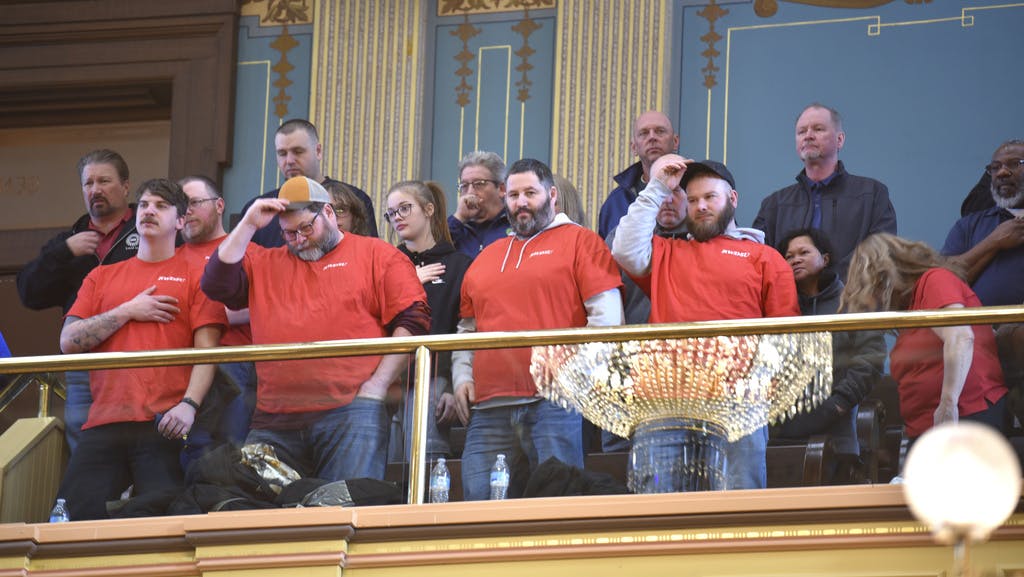Right-To-Work Laws Re-Emerge as National Political Issue With Michigan Repeal of Anti-Union Measure
Repealing the law represents a triumph for Wolverine State Democrats, who won leadership of both houses of the state legislature in 2022 as well as the governor’s office.

Michigan repealing its right-to-work law — the first state to do so in nearly 60 years — is teeing up the issue ahead of the 2024 presidential campaign, reviving an issue that has long been on the back burner in American politics.
“Today, we are coming together to restore workers’ rights, protect Michiganders on the job, and grow Michigan’s middle class,” Governor Whitmer said when she signed the legislation last week.
Repealing the law represents a triumph for Democrats, who won leadership of both houses of the state legislature in 2022 as well as the governor’s office.
“It’s a new day here in Lansing,” Senate Majority Leader Winnie Brinks said ahead of the vote. ”It’s time to once again make Michigan known as a place where workers want to come.”
A right-to-work law is a measure that gives employees in a unionized workplace the right to choose whether or not to join a union and pay union dues, even if their position is covered by a collective bargaining agreement.
This allows for so-called “free riders,” or workers who are represented and bargained for on behalf of a union but do not pay union dues, making it difficult for unions to operate in right-to-work states.
Republicans in the state, who passed the law when they were leading both houses of the legislature in 2012, argued that repealing the law would make Michigan a less business-friendly state.
The Michigan House minority leader, Matt Hall, said in a statement that “businesses will find more competitive states for their manufacturing plants and research and development facilities, and workers and careers will drift away.”
The president of the Small Business Association of Michigan and the lieutenant governor when the law was passed, Brian Calley, also criticized the law, telling the Associated Press that it “eliminates the right of workers to decide for themselves if they wish to join a union.”
Right-to-work laws are one of the less-discussed divides in American politics, with the country being roughly split down the middle in terms of which states have right-to-work laws.
Currently, 26 states have right-to-work laws on the books, with the most recent state adopting the measure being Kentucky in 2017. Missouri legislators passed a right-to-work law in 2017, but voters overwhelmingly rejected the law when it was put up as a ballot measure.
On the national level, House Republicans could pass a national right-to-work law as early as this year after Congressman Joe Wilson of South Carolina introduced the National Right to Work Act in late February.
“South Carolina is a right-to-work state, and we have seen tremendous economic growth by expanding economic freedom for our businesses,” Mr. Wilson said in a statement. “Eighty percent of people in our country support putting an end to dues as a condition of employment.”
The House measure is unlikely to meet the threshold of a filibuster-proof majority in the Senate, however. Even with the support of Senators Manchin and Sinema it looks likely to die in the upper chamber.
Ahead of 2024, the issue could become more prominent as Democrats move to position themselves as pro-union. Aside from the near even split between right-to-work and non-right-to-work states, the issue is positioned to be an wedge issue because of Americans’ seemingly contradictory beliefs concerning union support and right-to-work.
Although there is a dearth of national level polling on the issue, state level polls consistently find public support for the policy, with a December 2022 Mackinac Center for Public Policy poll of Michigan suggesting that 60 percent of respondents approved of the right-to-work law while only 17 percent opposed it.
At the same time, support for unions in America hit its highest point since 1965, according to a Pew Research poll conducted last summer that found 71 percent of respondents approved of labor unions.
With President Biden positioning himself as “the most pro-union president you’ve ever seen,” despite the recent forced adoption of a collective bargaining agreement for rail workers last year, these union-centric issues could be an area for potent criticism in his expected 2024 re-election campaign.

